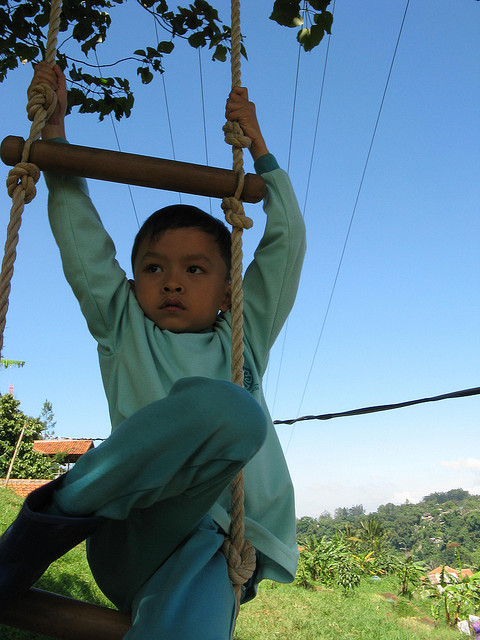
When I was young, my grandmother gave me a rolled-up rope ladder. She told me to put it near my bedroom window, and if there was ever a fire, I could use the rope ladder to escape down the side of the house.
Of course, from then on all I could think about every time I looked at the ladder was that our house was going to erupt in flames some night, but that was not her intent. Her intent was to keep me safe. I never used the rope ladder, of course. The only way I ever got to and from my bedroom was by using the stairs.
I tell you this story because a friend e-mailed me recently to say that during the scrutiny rite in her parish she wanted to stand up and yell out, “NOOOOOO!” It seems the RCIA director there decided to scrutinize not only the elect, but also the baptized candidates. And, for good measure, the entire assembly!
Just use the stairs—and the appropriate rites
Both my grandmother and the RCIA director had good intentions. The difference is, Grandma never expected me to come down to breakfast by climbing out my bedroom window. That was for emergencies only. Our house was built with a perfectly fine, helpful, useful solution for getting people to and from the second floor—a staircase. Why in the world would someone do it any differently?
The rites of the church are also built with perfectly fine, helpful, useful solutions for deepening our faith. But for some reason, some ministry leaders seem intent on forcing people to go out the bedroom window. Sometimes, there isn’t even window, and they rip a hole in the sacramental wall to force people through it.
Scrutinies are for the unbaptized—and no one else
So just to be clear, there is no pastoral reason to put baptized people through the scrutinies. The rite is not built for that, and it does no pastoral good to put the baptized through it. The scrutinies are for those who “are asking for the three sacraments of initiation” (RCIA 142). The RCIA also says: “These rites, therefore, should complete the conversion of the elect and deepen their resolve to hold fast to Christ and to carry out their decision to love God above all” (RCIA 141).
There is nothing in there about the purpose of the scrutinies having anything to do with the baptized. You have to rip a hole in the scrutinies in order to put the baptized through it, and then the ritual makes no sense. That’s why my friend wanted to yell out a warning.
If we want the baptized candidates or the faithful Catholics to “deepen their resolve to hold fast to Christ,” there are other rituals, other structures, that are built for them.
There is no pastoral reason to put baptized people through the scrutinies. The rite is not built for that, and it does no pastoral good to put the baptized through it.
The way we pray matters
This matters because the way we pray teaches us and the elect what we believe. If the way we pray makes no distinction between the unbaptized and the baptized, we are teaching a heresy—that baptism makes no difference.
Baptism does make a difference, of course. It makes all the difference in the world. So next time you see someone ripping a hole in an RCIA ritual, just stand up and yell out, “NOOOOOO!”, and show them to the stairs.
What do you think?
Have you witnessed an RCIA ritual that blurred the distinction between the unbaptized and the baptized? How did you handle it?











Nick, a neighboring parish is doing the same thing, scrutinizing everyone relentlessly, with Jeffersonian equality. I love your metaphor about the rope ladder. The other thing of course is that with these Sundays so often coinciding with spring break, the number of assumed dispensations from the (not-optional-three) scrutinies is mountainous. I wonder whether we will ever ever grasp the importance of and initiation rites for the unbaptized, or for that matter, baptism for the rest of us!
“Jeffersonian equality”! Love that. The same “equality” happens at the Easter Vigil when we receive the baptized candidates. It’s always a struggle to convince parishes that receiving the candidates *before* the Vigil is an upgrade so that they can participate with us “in full communion” for the entire Triduum.